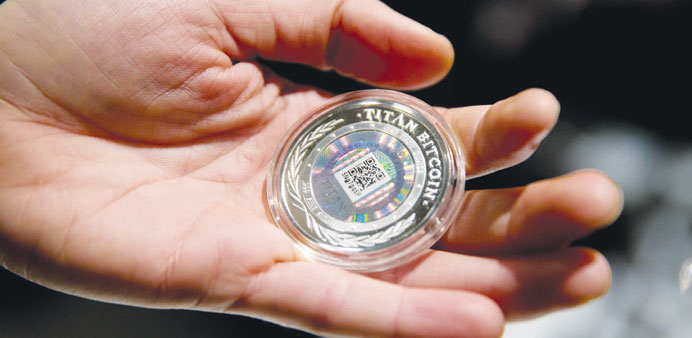A Titan Bitcoin exhibitor displays a silver minted coin during the Inside Bitcoins conference in New York. Bitcoins, which jumped to more than $1,200 last year, are trading at about $420 apiece now.
Speculators, known as miners, use powerful computers to solve complex software problems and verify transactions to unlock new bitcoins. They’re finding that the enterprise isn’t as profitable as it once was.
Drawn by the virtual currency’s jump in value last year, digital prospectors have turned the mining industry into an arms race as they buy expensive computing equipment and gobble up electricity. While that worked well as long as bitcoin’s value kept rising, smaller players are now being crowded out by bigger competition, high utility bills and declining prices.
“If you mine at the moment, you have to be very lucky to get anything,” said Mehmet Vatansever, who bought $16,000 worth of mining computers in February to chase after new bitcoins. “It’s a very difficult business.”
Mining, a nod to the excavation of minerals and metal ore, is entirely digital and part of bitcoin’s design, so that the money self-regulates supply and prevents out-of-control inflation. The mining process gets increasingly complicated as more bitcoins are created, driving demand for computing power.
Bitcoins, which jumped to more than $1,200 last year from $12, were trading at about $420 apiece now, according to the CoinDesk Bitcoin Price Index, an average of prices across major global exchanges. China’s tighter controls on alternative currencies, the implosion of the Mt Gox exchange and a US Internal Revenue Service ruling that bitcoins should be taxed as a property have all weighed on the virtual currency.
While he has been able to create new bitcoins, Vatansever soon discovered that his equipment was on track to earn less than his monthly utility bill of $480. After selling his computers on EBay Inc in April, Vatansever estimates that he lost a total of about $6,000 on his mining adventure.
In the past week, miners made $14.9mn in revenue, compared with a weekly average of $25.2mn in December, according to Blockchain.info, a bitcoin-data aggregator. The figures represent the number of bitcoins mined plus transaction fees, multiplied by the dollar-based market price.
EBay now features more than 1,600 listings for mining computers, many of them used.
“The mining market has evolved from being mostly isolated ventures to more organised entrepreneurial ventures that are still racing to get an edge with increasingly fast equipment and lower electricity costs,” Gil Luria, an analyst at Wedbush Securities Inc, said in an interview. “At this point, the opportunity for individual miners is very small.”
While individuals give up prospecting, at least two other larger mining companies, KnCMiner and Cloud Hashing, are still generating profits. By scaling up operations, they’ve been able to save costs on cooling and power, making their computers more efficient and cost-effective. KnCMiner also sells mining computers to other miners.
KnCMiner, based in Stockholm, operates about 7,000 machines. While the mining company’s electric bill in March came to $450,000, the computers mined 21,000 bitcoins, according to co-founder Sam Cole.
Cloud Hashing, which lets people buy computing capacity in its data center and share in profits, mines about $230,000 to $260,000 worth of bitcoins a day, according to Chief Executive Officer Emmanuel Abiodun.
“We are profitable whether we sell contracts or not - through mining,” Abiodun said in an interview. “Our business model can handle volatility in pricing.”

